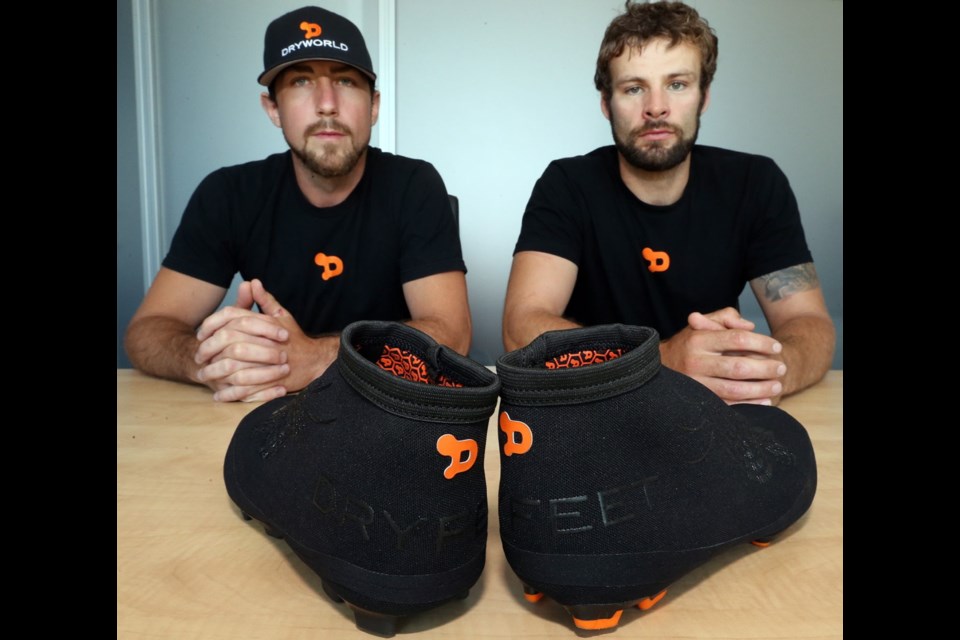It’s difficult to tell what’s causing more frustration for the founders of Dryworld Industries.
Is it the ups and downs of a startup business hungry for cash in order to get production rolling, or the steady stream of rainless days in Victoria?
Matt Weingart and Brian McKenzie believe they have come up with the next big thing in performance apparel for rugby, soccer and football players with Dryfeet. The 1.8-ounce neoprene sleeves to cover cleats keeps feet dry and warm in the wettest weather, all the while improving performance.
If there’s ever a drop of rain in the forecast, they may even sell a few.
“It’s an exciting time, but it’s also a frustrating time,” said McKenzie, as he stared out across a sun-baked pitch from offices at the Pacific Institute for Sports Excellence in Saanich. “But over the course of the last two years Matt and I have had to learn how to deal with these wild swings.”
So far, the pair of rugby players have had to deal with some investors getting skittish, an early iteration of the product that kept slipping out of place and now the kind of hot, dry weather that hardly inspires rugby and soccer players to think about weatherproofing.
However, McKenzie said the dry weather and having to delay a large production run has given them a chance to work on the back-end of the company, develop new product and has them ready to sprint from the starting gate when conditions align.
The company has just started an Indiegogo crowdfunding campaign (indiegogo.com/projects/dryfeet) to help raise money toward a larger production run. The campaign, which as of Wednesday afternoon had raised $2,241, aims to raise $100,000 toward the $250,000 needed to produce 9,000 pair.
“It’s an avenue to raise some cash, but we do have a number of plates spinning in the air,” said Weingart.
He would like to undertake a direct sales tour in the fall so they could be “field-side when it’s pouring rain at rugby, soccer and football games.”
The idea for the Dryfeet product took hold three years ago when Weingart bought a sheet of neoprene and contracted a seamstress to sew a prototype. Two years and 26 versions of what is now a technical compression overshoe, and Dryfeet was ready for the market.
But in order to make products you need money, so the pair started Rocks Stonemasonry along with Kevin Wilson. To date their company has contributed about $60,000 to the project.
“We break rocks by day and bounce ideas off each other, then we work on them at night,” said Weingart.
Weingart admits for a couple of athletes who break rocks and create stone living spaces and retaining walls for a living, the learning curve of developing footwear and other performance gear has been “straight up.”
“It’s been intuitive, we’ve been athletes for so long we listen to our bodies and what feels right,” he said.
And they appear to have hit on something with the footwear.
The company has produced 300 pairs of Dryfeet, which it has distributed to professional athletes in 10 different countries.
While most have gone to rugby players, there are soccer players and some CFL players, including Toronto Argonauts running back Chad Kackert, who have worn them and provided useful feedback that has helped improve the product.
In a statement, Kackert noted feet are the foundations for any athlete.
“If your feet get wet, cold or uncomfortable, your mind is not committed to your task. It’s important to minimize distractions so can focus on the task at the hand. Dryfeet not only provides this prevention, but a higher level of comfort,” the Canadian Football League running back said.
McKenzie said some soccer players have told them they are getting more power and control with their shots. The sleeve’s design offers a gripping on the upper that has proved to hold the ball better than some cleat surfaces. A number of CFL players have said they like the compression aspect “that makes their feet feel lighter.”
“Most people don’t think [wet and cold feet] are a problem because they don’t know there’s a solution,” said McKenzie.
Dryworld is working with the Sport Innovation and Research Centre at the Pacific Institute for Sport Excellence to test the gear and to determine what advantage athletes may get from wearing the overshoe.
That kind of data may help them sell even in the hot summer months.
“We expect the initial uptick will be in the wet weather, but as the product gets out there you’ll see more people wearing it in summer,” said McKenzie.
The pair estimate Dryfeet will fit 90 per cent of the cleat patterns on the market, though McKenzie points out the ones it doesn’t fit tend to be at the highest-cost end of the spectrum.
Dryfeet is available in select stores — in Victoria it’s on display at Soccer World and Spank It Sports — for $109 US and online in sizes four through 15.
The company has also branched into developing gear that suits training and playing both contact and combat sports.
“We’re calling it aggression apparel. It’s our spin on compression apparel,” said Weingart, noting it is still being tested by a number of athletes.



